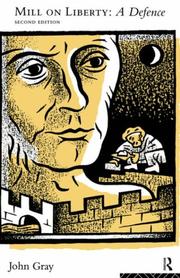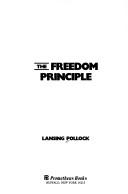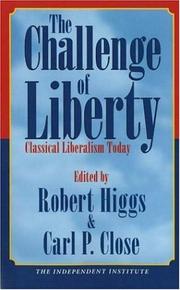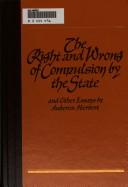| Listing 1 - 10 of 29 | << page >> |
Sort by
|

ISBN: 1134802870 1280157402 0203432479 0203291239 9780203291238 9780203432471 0203740718 9780203740712 0415124743 9780415124744 9781134802876 9781280157400 9781134802821 9781134802869 9781138834125 1134802862 Year: 1996 Publisher: London,
Abstract | Keywords | Export | Availability | Bookmark
 Loading...
Loading...Choose an application
- Reference Manager
- EndNote
- RefWorks (Direct export to RefWorks)
Mill on Liberty was first published in 1983 and has become a classic of Mill commentary. The second edition reproduces the text of the first in full, and in paperback for the first time. To this, John Gray adds an extensive postscript which defends the interpretation of Mill set out in the first edition, but develops radical criticisms of the substance of Millian and other liberalism.
The new edition is intended as a contribution to the current debate about the foundations of liberalism, and it looks closely at the recent seminal contributions to liberal thought by Raz, Feinberg, R
Liberty. --- Civil liberty --- Emancipation --- Freedom --- Liberation --- Personal liberty --- Democracy --- Natural law --- Political science --- Equality --- Libertarianism --- Social control --- Mill, John Stuart,

ISBN: 0879751576 9780879751579 Year: 1981 Publisher: Buffalo,
Abstract | Keywords | Export | Availability | Bookmark
 Loading...
Loading...Choose an application
- Reference Manager
- EndNote
- RefWorks (Direct export to RefWorks)
Libertarianism --- Liberty --- Civil liberty --- Emancipation --- Freedom --- Liberation --- Personal liberty --- Democracy --- Natural law --- Political science --- Equality --- Social control --- Anarchism --- Individualism
Book
ISBN: 9789026324093 Year: 2011 Publisher: Amsterdam,
Abstract | Keywords | Export | Availability | Bookmark
 Loading...
Loading...Choose an application
- Reference Manager
- EndNote
- RefWorks (Direct export to RefWorks)
Political philosophy. Social philosophy --- Liberty --- Multiculturalism --- Welfare state --- State, Welfare --- Civil liberty --- Emancipation --- Freedom --- Liberation --- Personal liberty --- 110 --- ethiek --- politieke filosofie --- wijsbegeerte overige werken --- philosophie autres ouvrages

ISBN: 1598130021 9781598130027 1306013550 1598131095 Year: 2006 Publisher: Oakland,
Abstract | Keywords | Export | Availability | Bookmark
 Loading...
Loading...Choose an application
- Reference Manager
- EndNote
- RefWorks (Direct export to RefWorks)
The quest for freedom has always been as much a battle of ideas as it is a popular struggle. Classical liberal pioneers such as John Locke and Adam Smith stressed the inherent worth of the individual, inalienable rights, and the benevolent consequences of the cooperative, peaceful pursuit of one's own happiness. These ideas became the intellectual scaffolding for much of the West's most fundamental institutions and achievements. Yet after its 19th-century high-water mark, classical liberalism lost much of its passion, focus, and popular support. Intellectual trends increasingly began to suppor
Liberalism --- Liberty --- Civil liberty --- Emancipation --- Freedom --- Liberation --- Personal liberty --- Liberal egalitarianism --- Liberalism. --- Liberty. --- Democracy --- Natural law --- Political science --- Equality --- Libertarianism --- Social control --- Social sciences
Book
ISBN: 9781107689534 9781139197175 1139197177 9781107414877 1107414873 9781107387904 1107387906 1107689538 1107387108 1107299977 1139894110 1107395623 1322521514 9781107387102 9781107299979 9781139894111 9781107395626 Year: 2012 Publisher: Cambridge,
Abstract | Keywords | Export | Availability | Bookmark
 Loading...
Loading...Choose an application
- Reference Manager
- EndNote
- RefWorks (Direct export to RefWorks)
This extended essay by one of the world's leading historians seeks, in its first part, to excavate and to vindicate, the neo-Roman theory of free citizens and free states as it developed in early modern Britain. This analysis leads on to a powerful defence of the nature, purposes and goals of intellectual history and the history of ideas. As Quentin Skinner says, 'the intellectual historian can help us to appreciate how far the values embodied in our present way of life, and our present ways of thinking about those values, reflect a series of choices made at different times between different possible worlds'. This essay provides one of the most substantial statements yet made about the importance, relevance and potential excitement of this form of historical enquiry. Liberty before Liberalism is based on Quentin Skinner's Inaugural Lecture as Regius Professor of Modern History in the University of Cambridge, delivered in 1997.
Liberty. --- Liberalism. --- Liberal egalitarianism --- Liberty --- Political science --- Social sciences --- Civil liberty --- Emancipation --- Freedom --- Liberation --- Personal liberty --- Democracy --- Natural law --- Equality --- Libertarianism --- Social control

ISBN: 1614878099 9781614878094 091396641X 9780913966419 0913966428 9780913966426 Year: 1978 Publisher: Indianapolis, Ind.,
Abstract | Keywords | Export | Availability | Bookmark
 Loading...
Loading...Choose an application
- Reference Manager
- EndNote
- RefWorks (Direct export to RefWorks)
Liberty. --- Individualism. --- Civil liberty --- Emancipation --- Freedom --- Liberation --- Personal liberty --- Democracy --- Natural law --- Political science --- Equality --- Libertarianism --- Social control --- Economics --- Self-interest --- Sociology --- Personalism --- Persons
Book
ISBN: 3720152332 9783720152334 Year: 1991 Publisher: Zürich,
Abstract | Keywords | Export | Availability | Bookmark
 Loading...
Loading...Choose an application
- Reference Manager
- EndNote
- RefWorks (Direct export to RefWorks)
Liberty --- Political science --- -Socialism --- -Marxism --- Social democracy --- Socialist movements --- Collectivism --- Anarchism --- Communism --- Critical theory --- Administration --- Civil government --- Commonwealth, The --- Government --- Political theory --- Political thought --- Politics --- Science, Political --- Social sciences --- State, The --- Civil liberty --- Emancipation --- Freedom --- Liberation --- Personal liberty --- Democracy --- Natural law --- Equality --- Libertarianism --- Social control --- Philosophy --- History --- -Liberty. --- Socialism --- Philosophy. --- -Philosophy --- -Liberty --- Liberty. --- -Civil liberty --- Marxism --- Political philosophy
Book
ISBN: 9053526927 9789053526927 Year: 2001 Publisher: Amsterdam,
Abstract | Keywords | Export | Availability | Bookmark
 Loading...
Loading...Choose an application
- Reference Manager
- EndNote
- RefWorks (Direct export to RefWorks)
In deze tijd lijkt de grens tussen tolerantie en onverschilligheid te vervagen. Bekende publicisten, filosofen, juristen, historici en sociologen denken in dit boek na over een minder vrijblijvende, minder 'lege' tolerantie.Zo schetst men diepgaand de geschiedenis van de tolerantie en geeft men een filosofische beshouwing over het tolerantiebegrip, waarbij een eigen stellingname niet geschuwd wordt. Het deel 'Tolerantie in discussie' bevat een reeks korte artikelen, soms polemisch, dan weer beschrijvend van aard, waarin het onderwerp vanuit een caleidoscopisch oogpunt wordt belicht. Het boek wordt afgesloten met een korte slotbeschouwing waarin men over de betekenis van tolerantie in deze tijd en over de politieke implicaties enkele conclusies trekt.
-Bigotry --- Liberty --- Toleration --- Civil liberty --- Emancipation --- Freedom --- Liberation --- Personal liberty --- Democracy --- Natural law --- Political science --- Equality --- Libertarianism --- Social control --- Bigotry --- Intolerance --- Tolerance --- Virtues --- Discrimination --- Netherlands --- Social conditions. --- Liberty. --- Political philosophy. Social philosophy --- Social ethics --- Sociology of culture
Book
ISBN: 0802053610 9780802053619 Year: 1977 Publisher: Toronto,
Abstract | Keywords | Export | Availability | Bookmark
 Loading...
Loading...Choose an application
- Reference Manager
- EndNote
- RefWorks (Direct export to RefWorks)
Law --- Liberty --- Utilitarianism --- Jurisprudence --- Ethics --- Hedonism --- Philosophy --- Civil liberty --- Emancipation --- Freedom --- Liberation --- Personal liberty --- Democracy --- Natural law --- Political science --- Equality --- Libertarianism --- Social control --- Bentham, Jeremy, --- Legal theory and methods. Philosophy of law --- Bentham, Jeremy
Book
ISBN: 9780521182096 9780511793325 9781107005075 0511793324 9781107341425 1107341426 9781107345171 1107345170 1299773117 9781299773110 1107005078 0521182093 1107357292 1107234182 110734767X Year: 2013 Publisher: New York, N.Y.,
Abstract | Keywords | Export | Availability | Bookmark
 Loading...
Loading...Choose an application
- Reference Manager
- EndNote
- RefWorks (Direct export to RefWorks)
Liberal individualism, or 'classical liberalism' as it is often called, refers to a political philosophy in which liberty plays the central role. This book demonstrates a conceptual unity within the manifestations of classical liberalism by tracing the history of several interrelated and reinforcing themes. Concepts such as order, justice, rights and freedom have imparted unity to this diverse political ideology by integrating context and meaning. However, they have also sparked conflict, as classical liberals split on a number of issues, such as legitimate exceptions to the 'presumption of liberty', the meaning of 'the public good', natural rights versus utilitarianism, the role of the state in education, and the rights of resistance and revolution. This book explores these conflicts and their implications for contemporary liberal and libertarian thought.
Liberalism. --- Liberty. --- Individualism. --- Economics --- Equality --- Political science --- Self-interest --- Sociology --- Libertarianism --- Personalism --- Persons --- Civil liberty --- Emancipation --- Freedom --- Liberation --- Personal liberty --- Democracy --- Natural law --- Social control --- Liberal egalitarianism --- Liberty --- Social sciences --- Social Sciences --- Political Science
| Listing 1 - 10 of 29 | << page >> |
Sort by
|

 Search
Search Feedback
Feedback About UniCat
About UniCat  Help
Help News
News